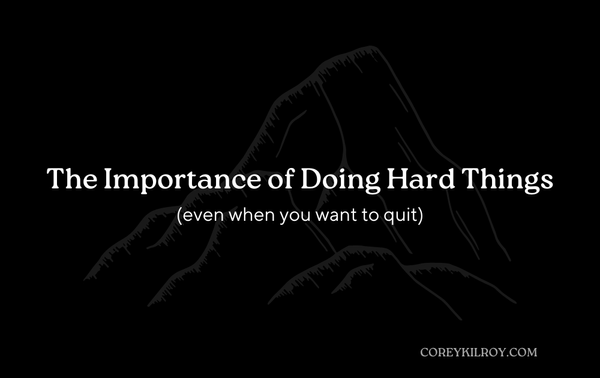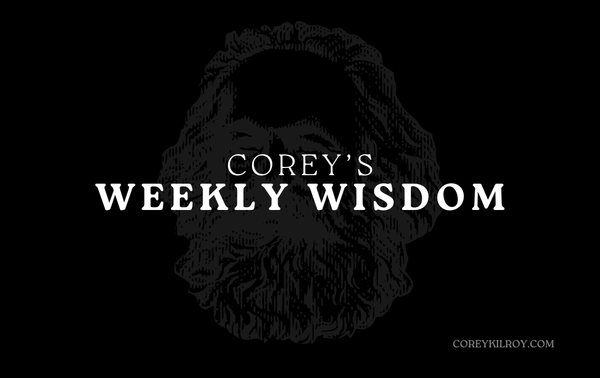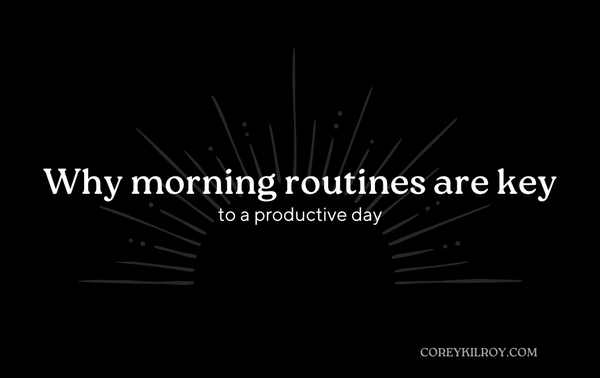The Pursuit of More.
Arrival Fallacy - "okay, what's next?"

"Be fearless in the pursuit of what sets your soul on fire"
You did it!
You’re walking across the stage, the Dean hands you your diploma, and you’ve finally graduated from university!
After tireless nights of studying, getting assignments done, internships, 4 years of undergrad, plus the 12 years of school prior, you’re finally “off into the real world” (unless you’re going back to school for more).
However, as soon as you lay a finger on that piece of paper you worked your whole life for, your immediate thought is, “okay, what’s next”.

At least that’s what happened to me that day.
After all those years, I always thought to myself, “I can’t wait to graduate college and finally get my diploma!”
I spent the day celebrating, yes, but in reality, I was also constantly thinking about what I was going to do with the rest of my life.
But why did I feel this way? I mean, I worked so hard for this day to finally come. Why wasn’t I soaking it all in 110%?
This notion – that fulfilling our goals doesn’t equal happiness – now has a name.
Enter, “arrival fallacy”.
This term “arrival fallacy” is a term given to the illusion that once we make it, attaining our goal, or reaching our destination, we will reach everlasting happiness.
“Arrival fallacy is basically the repackaging of motivation,” said by Brent Macdonald, psychologist and associate professor at The University of Calgary.
“When people set goals for themselves and achieve them, they can then be left with this kind of void—they’ve [achieved their goals] and they’re still not happy,” he says.
Individuals may experience brief contentment, but it doesn’t last, and so they may feel depressed or look for another objective. Alternatively, they may never achieve the goal and blame such failure for their unhappiness.
Tony Hale, actor and producer, known for his roles in Arrested Development, Veep, and Toy Story 4, decided to create a children's book called Archibald’s Next Big Thing, where
“an extra-ordinary newly-hatched chicken named Archibald Strutter is looking to find his place in the world while feeling insecure about his abilities. His three brothers and one sister have each found their Big Thing, while the only Big Thing Archibald has planned is what he's eating for lunch. But everything changes for Archibald when he receives a mysterious blue card that reads, "Your Big Thing Is Here!" Accompanied by a friendly bee named Bee, Archibald heads out on a journey, where he encounters wondrous places and incredible people, all the while searching for something more, not realizing every moment he faces is it—Archibald's Next Big Thing. It's a story that reminds readers that, while looking for the next big thing isn't a bad thing, big and beautiful things are all around us right now.”
Pretty deep stuff for a children’s book, eh?
But the lesson behind it is not something only children can learn from.
Professional athletes deal with arrival fallacy all the time.
After winning the Super Bowl in 2011, Green Bay Packers QB, Aaron Rodgers, had this discernable feeling of “okay, what’s next”, even though he had just won the most prestigious football accolades in the world.
It was a void – a realization that he was, in the words of the reporter to whom he told his story, still looking for something “beyond his current line of sight.”
Why Should You Care?
You’ve heard it before, but it’s as true as ever…
“Life is all about the journey, not the destination”
The championships, diploma, promotion, new car, every desirable accolade in life teaches us life lessons and skills – through the journey – that are much more valuable than the end goal itself.

We need to redefine how we consider success.
Achievement isn’t an endpoint to be reached, but it is the journey of how we got there that makes it much more meaningful.
Success means that celebrating what we can achieve together is far more important than gathering credit for what you feel you’ve accomplished on your own.
In movies, you’ve heard of the never-present father who only ever focused on his career, but 18 years later his children and wife don’t love him because of his neglect of being a father.
It’s not about the end goal that creates happiness, but it’s the people and lessons learned along the way that bring the most fulfillment in life.
If you suffer from arrival fallacy, then it’s a sign your happiness in life depends on certain achievements.
Thinking “oh, I’ll be happy when [I get a new job, buy that new car, move to a new city]” poses a threat to your mental health.
This is because you’re associating the goal with happiness.
Read that again.
The problem with that is happiness isn’t a guarantee, nor is it a constant. Instead, you should consider asking yourself, “what makes me happy now?” and focus on that.
How to Fix This?
1. Enjoy the journey instead of wishing for the outcome
It may sound obvious, but remaining present and enjoying the process of working towards your goals will always be much more meaningful to you compared to primarily focusing on the end goal itself.
A wonderful analogy was described by Tony Riddle on the infamous Rich Roll Podcast describing this never-ending “what’s next” phenomenon:
We are built to walk uphill. And when we reach the pinnacle of the hill, what we want to do is appreciate the vision, but in reality we look at the next biggest hill to accomplish in the distance. It’s from the uphill climb that we derive our value.
This couldn’t have been described any better.
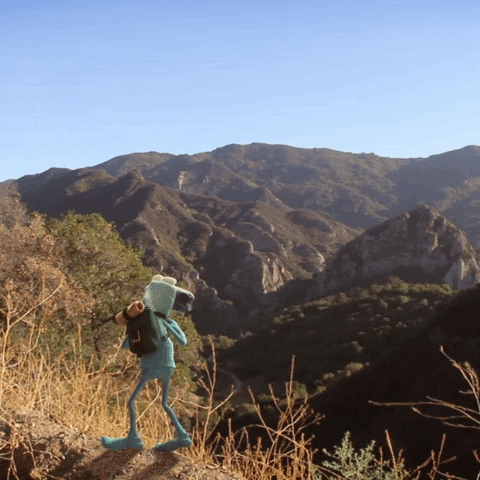
If you’re TRULY passionate about what you're working towards, then the process of getting there will always fire you up more compared to finally reaching that goal.
Imagine working your whole life just to make a million-dollar company. Then one day you finally make that 1 mill, and you decide to kick back and relax the rest of your life.
There would be a void. What would you work on now?
Not only did you extinguish that “fire” and passion inside you, but you just limited your business and yourself from making much more money!
You should never set a ceiling for yourself because that will always limit what you can achieve.
Enjoy and focus on the process and you will have an abundance of fulfillment in your life. PLUS, the end goal may very well be exceeded.
2. Practice mindfulness
Being mindful not only helps with your mental health but helps you become more self-aware.
This self-awareness will equip you with the tools and capability to focus on the journey set forth in front of you.
By becoming more self-aware, you will omit the constant anxiety about the future. That everlasting worry about “what’s next” will significantly diminish.
Get it yet?
When we live in the present moment, we allow ourselves to be present in all of life’s little moments – from simple conversations with our friends and family, to going on a hike in nature.
When we don’t live in the present, merely due to the tunnel vision never being shut off, then we miss out on so many opportunities for joy and connection with others.
Here are some ways you can practice mindfulness:
a. Meditate
→ Find a comfortable place to sit or lie down. You can close your eyes, but that’s optional – some people even find it better to keep their eyes open and focus on something in the room (maybe a speck on the wall, or an object).
→ Take a deep breath in and exhale slowly. Focus on your breath – picturing the air flowing in and out of your nose – or on the physical sensations in your body.
→ Bring your mind back to the present moment by focusing on an object in your current environment or thinking about something specific that’s happening (i.e. the drive to work, or walking your dog). If these strategies aren’t helpful to you, try journaling, mindfulness apps, retreats or whatever works for you!
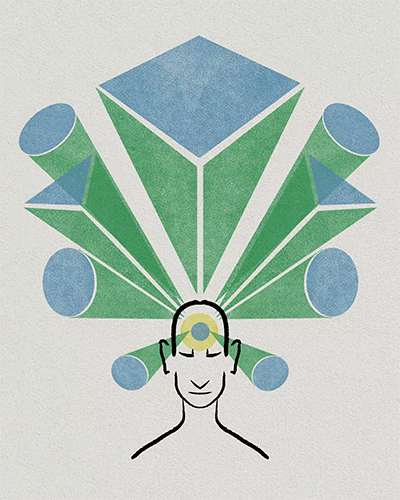
b. Start Journaling
→ Our minds wander all day long without us even realizing it. Hundreds of thoughts and ideas pass through our minds at all times and we need an outlet for keeping track of those things – enter journaling. Our minds are not meant for storing ideas, they’re simply meant for creating them. Dump all of your thoughts, ideas, gratitudes, anything into a journal every day or week and become aware of what you do and how that affects your mood.
c. Do something you truly care about
→ Ever heard about “Flow State”? This describes a feeling where, under the right conditions, you become fully immersed in whatever you are doing
→ Taking part in activities that you’re truly passionate about will bring about this state and all you’ll care about in that moment is that activity. Welcome, you’ve just entered the present moment.
→ When you’re giving your fullest attention to an activity or task that you are incredibly passionate about, singularly focused on, and totally immersed in, then that flow state takes over and you’re living purely in the present moment.
There are many other ways to practice mindfulness, but giving these a shot is a great place to start!
Staying Present + Increased Self-Awareness = Enjoying the JOURNEY
3. Take inventory of the positives in your life
It’s extremely important to take note of what makes you happy in life.
You have a big goal in mind – whether that be a new business, promotion, weight loss journey, or wedding, the list is infinite.
But how do you think you get there? Good times and people.
If you were to ask every successful person right now, “what do you think contributed the most to your success?” What do you think they’d say?
They’d most likely attribute it to the many passionate hours clocked in, alongside the positive moments and amazing people who worked together to get them there.
It’s something about the “little wins” and exciting moments with loved ones along the journey that makes each step that much more fulfilling.
Without these positives, the passion slowly dies out. There’s seemingly less and less motivation to go on.
The most effective way to acknowledge these positives is to take a deep breath and think about one positive thing that’s happening in your life. Sometimes even just that deep breath, that moment of calm, is in itself the positive.

4. Focus on Relationships
The benefits of supportive relationships far outweigh any other positive aspect in life, including money, status, and education.
“Everything is superseded by relationships,” says Macdonald. “So if your goal is to develop better relationships, you’re probably not going to have to deal with arrival fallacy.”
When you focus on developing and maintaining meaningful relationships with others, then the money, fame, and status, all become less important.
The journey will be much more enjoyable and your happiness will not be rooted within the end goal.
In the end…
It is still very important to set goals for yourself, just don’t let that end-goal be the source of your happiness.
When goal-setting, try laying out multiple concurrent goals, both in and out of your work life.
And the term “goal” can be applied loosely. Even just aiming to spend more quality time with your children or make new friends through volunteer work counts. (If you’re looking for advice on setting goals, read this.)
Additionally, you should banish any sentences like this: “I’ll be happy if I can just achieve X.”
The more you think about how to make yourself happier, or worried about your happiness levels relative to your peers, the less happy you’ll actually be.
It’s also found that individuals engaging in activities that made them happy correlated with overall happiness. In other words, don’t think, just do the things that make you feel good.
If working hard makes you feel good, then great. Jump right in. Just don’t expect getting that promotion or new to punch your ticket to bliss.
TL;DR
- “Arrival fallacy” is a term given to the illusion that once we make it, attaining our goal, or reaching our destination, that we will reach everlasting happiness.
- You’re most likely associating the end goal to your happiness
- Practice mindfulness and appreciate the journey over the destination.
Much love & #KEEPPLUGGIN
🙇🏻♂️🌱 Until Next Time, C.

